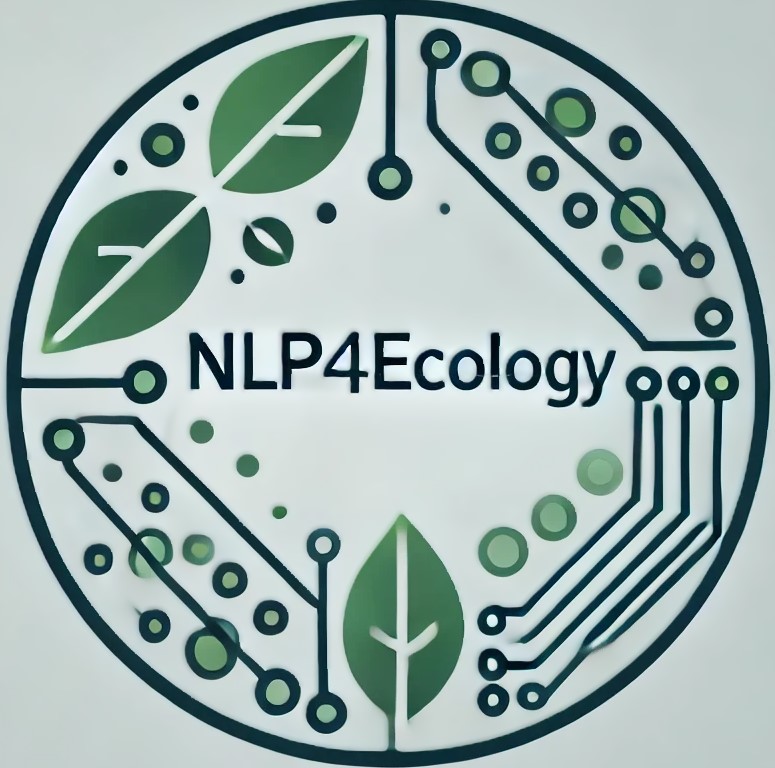NLP4Ecology 2025
the 1st Workshop on Ecology, Environment, and Natural
Language Processing
March 2, 2025, Hestia Hotel Europa, Tallinn, Estonia
Co-located with the Joint 25th Nordic Conference on Computational Linguistics and 11th Baltic Conference on Human Language Technologies. (NoDaLiDa/BalticHLT 2025)
Proceedings of NLP4Ecology 2025 available in the ACL Anthology [HERE]!
Anthropogenic ecological crisis, impacting people, non-human animals, and ecosystems worldwide, presents urgent challenges that require interdisciplinary action. The Natural Language Processing (NLP) community has a crucial role to play in addressing environmental challenges, as the responsibility to tackle these issues extends beyond scholars directly involved in environmental and climate change studies; it is a shared duty. NLP, with its ability to analyze large-scale textual data, provides essential tools to uncover language patterns and narratives that shape societal perceptions, behaviors, and policies toward the natural world.
This workshop invites scholars, practitioners, NGOs, and industry professionals to explore how NLP can be leveraged to address these ecological challenges. NLP applications include analyzing language across media, political discourse, and social platforms regarding climate change, biodiversity loss, and other environmental concerns, from plastic pollution to the fast fashion industry. It also involves identifying harmful language use, such as anthropocentric or speciesist biases, that contribute to detrimental attitudes and behaviors toward the environment. Conversely, NLP can also be used to detect and analyze positive discourse patterns that promote ecologically responsible behaviors.
We aim to attract a highly interdisciplinary audience and welcome contributions at the intersection of linguistics, ecology, and computer science, particularly from fields such as AI, computational linguistics, digital humanities, ecolinguistics, ethics, philosophy, and environmental humanities. Our goal is to expand research and collaboration, empowering the NLP community to play an active role in mitigating the ecological crisis through innovative and collective action.
Workshop Technical Program
| Time | Activity |
|---|---|
| 13:30 – 13:40 | Opening |
| 13:40 – 14:30 | Keynote Speech: Climate Crises, Vegan Meat, and Sustainable Fuels: How Words Shape Reality Tommaso Caselli, University of Groningen |
| 14:30 – 14:50 | Paper presentation 1 (L) Analyzing the Online Communication of Environmental Movement Organizations: NLP Approaches to Topics, Sentiment, and Emotions Christina Barz, Melanie Siegel, Daniel Hanss |
| 14:50 – 15:00 | Paper presentation 2 (S) Mining for Species, Locations, Habitats, and Ecosystems from Scientific Papers in Invasion Biology: A Large-Scale Exploratory Study with Large Language Models Jennifer D’Souza, Zachary M. Laubach, Tarek Al Mustafa, Sina Zarrieß, Robert Frühstückl, Phyllis Illari |
| 15:00 – 16:00 | Coffee Break (until 15:30) / Poster Presentations: – Efficient Scientific Full Text Classification: The Case of EICAT Impact Assessments (L) Marc Felix Brinner, Sina Zarrieß – Towards Addressing Anthropocentric Bias in Large Language Models (L) Francesca Grasso, Stefano Locci, Luigi Di Caro – Thematic Categorization on Pineapple Production in Costa Rica: An Exploratory Analysis through Topic Modeling (L) Valentina Tretti Beckles, Adrian Vergara Heidke – Perspectives on Forests and Forestry in Finnish Online Discussions – A Topic Modeling Approach to Suomi24 (S) Telma Peura, Attila Krizsán, Salla-Riikka Kuusalu, Veronika Laippala – Quantification of Biodiversity from Historical Survey Text with LLM-based Best-Worst-Scaling (S) Thomas Haider, Tobias Perschl, Malte Rehbein – The Accuracy, Robustness, and Readability of LLM-Generated Sustainability-Related Word Definitions (S) Alice Heiman – Towards Green Small Language Models (research communication) Nelie Laura Makenne, Ashwin Ittoo – The H4rmony Project: An Ecolinguistics Approach for Generative AI (research communication) Jorge Vallego, Eleanor Tiernan |
| 16:00 – 16:10 | Paper presentation 3 (S): Entity Linking using LLMs for Automated Product Carbon Footprint Estimation Steffen Castle, Julian Moreno Schneide |
| 16:10 – 16:20 | Paper presentation 4 (S): No AI on a Dead Planet: Sentiment and Emotion Analysis Across Reddit Communities on AI and the Environment Arianna Longo, Alessandro Longo |
| 16:20 – 16:40 | Paper presentation 5 (L): Large Language Models as Annotators of Named Entities in Climate Change and Biodiversity: A Preliminary Study Elena Volkanovska |
| 16:40 – 17:00 | Paper presentation 6 (L): From Data to Grassroots Initiatives: Leveraging Transformer-Based Models for Detecting Green Practices in Social Media Anna Glazkova, Olga Zakharova |
| 17:00 – 17:20 | Paper presentation 7 (L): Communicating urgency to prevent environmental damage: insights from a linguistic analysis of the WWF24 multilingual corpus Cristina Bosco, Adriana Silvina Pagano, Elisa Chierchiello |
| 17:20 – 17:30 | Closing |
Keynote Speaker: Tommaso Caselli, University of Groningen

Bio:
Dr. Tommaso Caselli is Assistant Professor in Computational Semantics at the Center for Language and Cognition (CLCG) of the Faculty of Arts of the University of Groningen. His main research interests are in event extraction and framing, hate speech and misinformation detection and countering. He is one of the founders of the “Event and Stories in the News” workshop series and the co-editor of the volume “Computational Analysis of Storylines” (CUP, 2021). He has been involved in the organization of several semantic evaluation campaigns for NLP for English and Italian. He has covered (senior) area chair positions (COLING, ACL, EMNLP, EACL) and his work is featured in major *CL conferences and journals. He has been awarded two “Outstanding Paper Award” (COLING 2022; ACL 2023) and one “Best Paper Award” (AACL 2022). Since November 2024, he is the coordinator of the theme “AI and Language” of the Jantina Tammes School of Digital Society, Technology, and AI of the University of Groningen.
Talk: Climate Crises, Vegan Meat, and Sustainable Fuels: How Words Shape Reality
Abstract:
The words we choose, the contexts in which they are uttered, and the actors conveying these utterances all have a critical role in the way we create narratives that influence our perception of reality. In some cases these narratives can be so strong that they defy the appearance: referring to the increase of the earth’s temperature as “global warming” hinders the destructive effects that higher temperatures have on the climate and the livability of the planet. “Vegan meat” is an oxymoron but the anchoring between the established concept (animal-based food) and the new one (plant-based alternative) can favor the acceptance of the latter in the protein transition debate. When presenting “sustainable fuels” as green solutions for mobility, companies fail to specifiy that sustaianbility is just a reduction of CO2 production when compared to fossil fuels. This talk is focused on the linguistic devices and their use to convey narratives where NLP is a methodology to uncover how the use of words affect the perceptions of different issues related to the ecological transition.
Call for Papers
We invite submissions to the 1st Workshop on Ecology, Environment, and Natural Language Processing. This workshop will bring together the NLP community and stakeholders from various disciplines to explore how computational linguistics and NLP tools, methods, and applications can help address pressing climate change and environment-related challenges. We are particularly interested in contributions that push the boundaries of linguistics and NLP research in the context of ecological and environmental crisis and that foster interdisciplinary collaboration.
The topics of interest include, but are not limited to:
Sentiment Analysis of Environmental Topics:
Evaluating public opinions on environmental issues across platforms such as social media, news outlets, and other media (e.g., Bosco et al., 2023; Ibrohim et al., 2023).
Automated Linguistic Analysis:
Studying grammatical, syntactical and lexical patterns from an ecolinguistic perspective (e.g., Widanti, 2022), including analyses of corporate environmental reports and other institutional communications (e.g., Gong, 2019).
Detection of Anthropocentric and Speciesist Biases
Identifying harmful biases in language and NLP applications, and developing methods to mitigate them (e.g., Leach et al., 2021; Takeshita et al., 2022).
Topic Modeling & Discourse/Frame Analysis:
Investigating how environmental issues are framed in media and political discourse and how these frames influence public perception and policymaking (e.g., Dehler-Holland et al., 2021).
Geo-tagging and sentiment mapping of environmental discussions:
Mapping environmental discussions and sentiments across geographical locations (e.g., Yao & Wang, 2020).
Ecofeminism, environmental justice, and language:
Exploring the intersections of gender, justice, and ecological narratives, and how NLP can help analyze language in these contexts.
Text Classification in Environmental Contexts:
Categorizing texts into specific environmental subfields such as biodiversity, climate change, and conservation, and using NLP to monitor compliance with environmental regulations (e.g., Schimanski et al., 2023; Grasso & Locci, 2024).
Entity Recognition, Relation Extraction, and Environmental Monitoring
Identifying and tracking mentions of species, habitats, pollutants, and ecological phenomena in text (e.g., Abdelmageed et al., 2022).
Fact-checking & Greenwashing Detection
Analyzing corporate sustainability reports for accuracy and detecting greenwashing practices (e.g., Moodaley & Telukdarie, 2023; Cojoianu et al., 2020).
Further topics include:
- Ecolinguistic applications of NLP.
- Large Language Models (LLMs) application in Climate Change and Environmental domain.
- Analyzing Social Media for Harmful Environmental Narratives.
- Corpora creation and annotation.
- Fairness and ethics in environmental data analysis.
- Environmental communication in low-resource languages.
- Multimodal analysis for ecological and environmental challenges.
- Lexical analysis in the context of sustainability and environmental discourse.
- Linked Data and Knowledge Graphs on ecological topics.
- Language diversity and inclusion in environmental narratives.
- Cognitive models and ecological narratives.
- NLP for understanding indigenous knowledge in environmental contexts.
- Machine learning techniques for analyzing environmental communication.
- NLP for tracking environmental legislation and policy discourse.
- NLP for analyzing environmental education and awareness campaigns.
- Speech recognition technologies to support ecological field research;
- Development of educational chatbots or FAQs for raising environmental awareness.
Key Dates
(All deadlines are 11:59PM GMT)
- Paper Submission Deadline:
December 16EXTENDED TO December 30, 2024 - Notification of Acceptance: January 24, 2025
- Camera-Ready Deadline: January 30th, 2025
- Workshop Date: March 2, 2025
Submission Instructions:
The workshop will accept archival submissions, non-archival submissions, as well as research communications . Non-archival submissions refer to new work that will not appear in the proceedings, while research communications consist of work already published at other venues (e.g., conferences, journals) that can be presented at the workshop but will not be included in the proceedings.
We also welcomes transdisciplinary contributions that link computational linguistics with disciplines from social sciences and the humanities, which may be presented in a dedicated slot during the event.
Submissions should follow the NoDaLiDa/Baltic-HLT 2025 formatting templates and guidelines; We invite paper submissions of three types:
- Regular paper (up to 8 pages)
- Short papers (up to 4 pages)
- Demo papers (up to 4 pages)
For all three submission types, these page limits do not include additional pages with bibliographic references. We do not allow any extra pages for appendices.
Submission and reviewing will be conducted through OpenReview via the following link: https://openreview.net/group?id=NoDaLiDa/Baltic-HLT/2025/Workshop/NLP4Ecology
All submissions will undergo double-blind peer review, adhering to professional standards.
Workshop Format
The workshop is planned as an in-person event, and on-site attendance is thus strongly recommended, as the workshop is intended to provide an opportunity for scholars to connect, share insights, and build a community. However, to ensure inclusivity and broader participation, we will offer hybrid participation for those unable to attend in person due to significant reasons.
All accepted papers must be presented at the workshop. For archival papers to appear in the proceedings, at least one author must register. More details are available on NoDaLiDa/Baltic-HLT 2025 main conference website.
The workshop proceedings will be published in the ACL Anthology.
Organizing Commettee
(In Alphabetical Order)

University of Turin, Italye-mail

University of Turin, Italy e-mail

University of Turin, Italy e-mail

University of Turin, Italye-mail

Uppsala University, Sweden e-mail

University of Potsdam, Germanye-mail
Program Commettee
(In Alphabetical Order)
- Davide Audrito – University of Turin, Italy
- Luca Brigada Villa – University of Pavia, Italy
- Tyler A. Chang – University of California San Diego, USA
- Luigi Di Caro – University of Turin, Italy
- Steffen Frenzel – University of Potsdam, Germany
- Sara Gemelli – University of Bergamo, Italy
- Frederikus Hudi – Nara Institute of Science and Technology, Japan
- Stefano Locci – University of Turin, Italy
- Stella Markantonatou – Athena Research Center, Greece
- Lucia Passaro – University of Pisa, Italy
- Maximos Skandalis – University of Montpellier, France
- Ivan Spada – University of Turin, Italy
- Amanda Starling Gould – Duke University, USA
- Masashi Takeshita – Hokkaido University, Japan
- Karolina Zaczynska – University of Potsdam, Germany
- Fabio Massimo Zanzotto – University of Rome “Tor Vergata”, Italy
